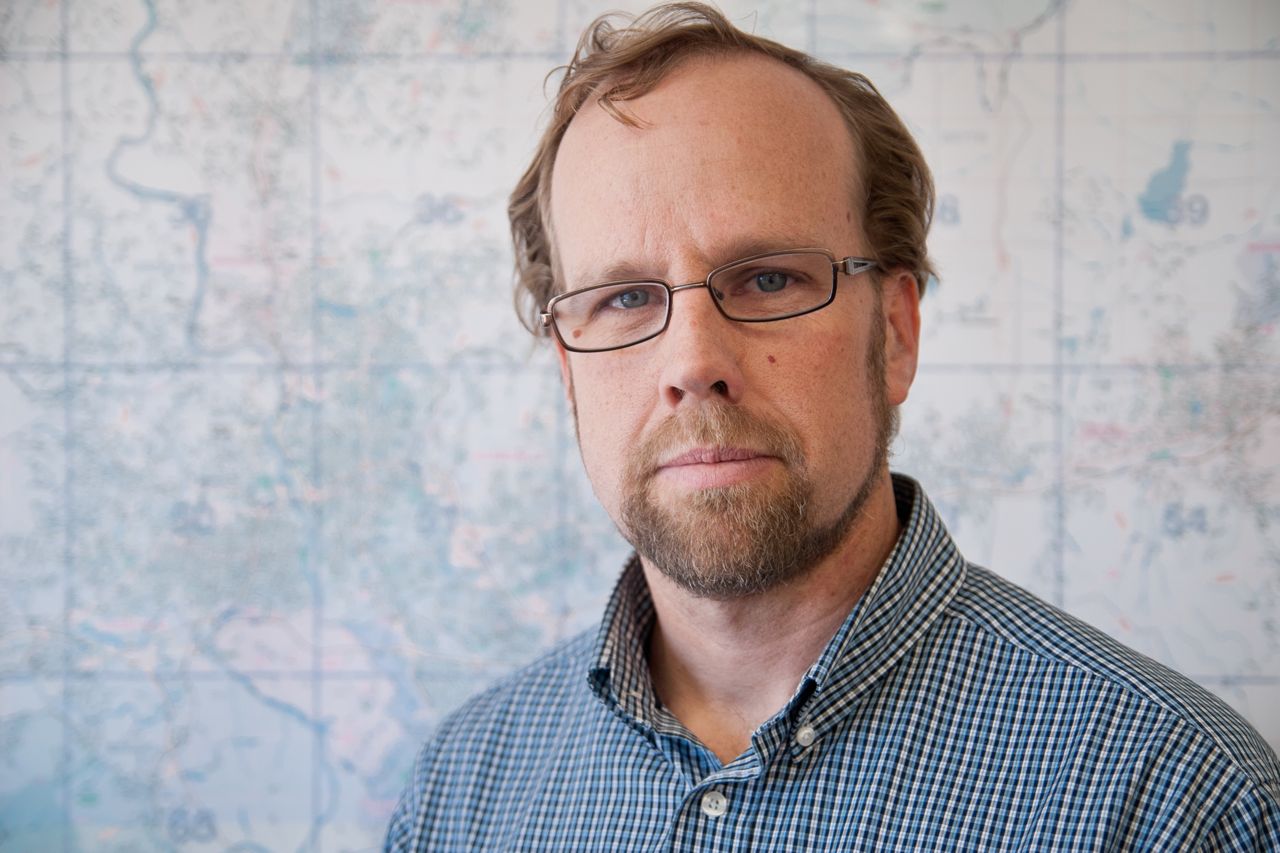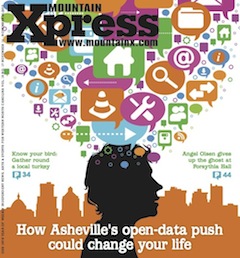Waiting for a bus, you consult an app that tells you exactly where the vehicle is at that moment.
Apartment-hunting, you check how many people have complained about your prospective landlord.
After finding your dream home, you look at whether crime in the area is rising.
Fighting a proposed development in your neighborhood, you monitor city staffers’ emails concerning the project.
Looking to start a business, you can immediately access zoning and neighborhood rules for that location, along with population estimates, population change and nearby transit stops.
None of these scenarios is feasible just yet, but all of them depend on free, ready access to local-government data, whether it’s crime statistics, bus routes, infrastructure, complaints, fire-safety records or even salaries. A collaborative effort involving the city of Asheville, area businesses and nonprofits is working to make such outcomes possible.
All these ideas were discussed during Asheville's Oct. 16 Open Data Day, when government officials, entrepreneurs, residents and media reps came together to brainstorm ways to make such information more accessible. (Full disclosure: I spoke briefly at the event about the role of the press.)
Although local governments have a huge amount of useful information that’s theoretically “public,” actually getting ahold of it can prove challenging, time-consuming and expensive. The idea is to bypass formal data requests (and the resulting demands on staff time to compile them) by enabling anyone with a computer or a smartphone to find out instantly what’s available — and access it, for free, anytime.
Open Data Day coincided with the city’s releasing a provisional version of an online open-data catalog. Meanwhile, Code for America, a national nonprofit that’s been described as a Peace Corps for geeks, has established a volunteer “brigade” in Asheville to help advance the process, with further assistance possible down the road.
Information now residing in city databases could help launch new businesses, create jobs, streamline bureaucracy and save money while empowering residents and communities alike. Indeed, city residents might soon be able to submit their own proposals or even vote on which data they want made public first. But if all this seems to be happening fast, it's actually the result of years of work.
Linking resources and needs
Jonathan Feldman, Asheville’s information technology director, says improved access and transparency has been a goal since he was hired seven years ago.
“When I first got here, there was a need,” Feldman recalls. “When you hear things about why X or Y is difficult to understand or hard to use, it makes me sit up and take notice.”

(photos by Max Cooper)
The city’s 2009 mapAsheville project was a good first step that also helped city staff locate useful information more quickly, but it’s increasingly out of date, says Feldman.
“Sometimes I think IT people are so busy running around patching the server that we can forget the server is actually supposed to be helpful to somebody,” he adds. “A lot of city staff know they used to spend a lot of time doing something, and now they spend less.” Nonetheless, maintains Feldman, more work was needed.
Nationwide, the push for open data is related to the open-government and Government 2.0 movements: a loose alliance of tech experts, businesses, government officials and nonprofits pursuing similar goals. Supported by Silicon Valley and the wider tech sector, the federal government’s recently launched Open Government Initiative has put these concerns in the spotlight.
At Asheville's Open Data Day, speakers from Philadelphia, St. Louis and the state of Maryland all talked about how their respective governments have improved access to data. City staffers have been tracking those and other examples for some time.
“It was natural for us to view the work that's been done elsewhere and say, 'Yeah!” Feldman reveals. “We want to hook people up with the right data and resources to make life better in some shape or form.”
Staff have also forged connections with local technologists and entrepreneurs. A few months ago, Feldman and others sent out emails arranging a meet-up and were surprised by the response.
“There was a lot of interest; it was obvious there was more to be said,” Feldman recalls. Open Data Day was designed to help coordinate those efforts. “We're not going to get where you need to get without conversations happening on a lot of levels.”
Technical challenges make some info harder to work with, so with the city's open-data portal (see box, “Local Open-Data Resources), notes Feldman, staff wanted to begin with what was easy, hoping to expand and refine the system later.
“You have to make a start,” he observes. “It's all evolving.”
Send in the brigade
A key component of the local open-government push is the volunteer brigade organized by Code for America.
Scott Barnwell, a GIS mapper who was active in community affairs before being hired by the city, leads the Asheville Brigade.

“I just think it makes the citizenry much more informed if they can get to the source documents,” he explains. “As we started learning more about the technologies available, Code for America bubbled to the top as a leader in this area.”
Barnwell quickly recognized open data’s time-saving potential for residents and staff alike.
“I get quite a few folks who contact us via email and want zoning or boundaries or bus routes. Then I have to go in and export files, put it on a site and email them,” he notes. “By having this in a format where people can just go to a site and grab it themselves, it frees me up to do other things.”
City staff talked with Code for America officials in August, laying the groundwork for the brigade. They’re currently recruiting volunteers.
Kevin Curry, who directs Code for America's nationwide CfA Brigade program, says it aims to bridge the gap between technologists and the broader community. Citing Boston's Adopt-a-Hydrant program, he explains, “It takes coders and designers to put the information online, keep it running, but then it takes good old-fashioned organizing, fire departments and volunteers to make use of it.”
Curry, who's dealt with open-government efforts nationwide, says Asheville's campaign has impressed him, noting, “The enthusiasm and ability in Asheville is really great, and it seems to be in the right places.” Virginia Beach, Va., his hometown, is a city of nearly 500,000, yet efforts similar to Asheville's are in their infancy there, he reports.
“There's a tendency to think that things happen in New York, San Francisco, Chicago, Philadelphia, but the landscape is so diverse that it's not just a function of size,” Curry asserts.
Turning data into jobs
Another way open-data advocates believe they can make a major impact is by creating a platform that can serve as a jumping-off point for addressing specific needs.
“I wouldn't be so arrogant as to say that Asheville’s opening up its data sets is going to lead to this groundswell of economic development,” cautions Feldman, “but I think local-government data is a national treasure. … You can see parcels on Google Maps: Guess where that comes from? Local government. We're the only ones who build that data.”
One Asheville company that’s already basing its business on such information is BuildFax, which compiles, re-formats and analyzes construction data nationwide. It currently employs 35 people.
"A company can come to us and ask for data on a number of properties throughout the nation and we can give it to them based on that local government data," Chief Technology Officer Joe Emison explains. "There aren't many commercially created data sets that are as valuable as what comes from government."
Emison thinks cities should focus on making political information more accessible. He envisions searchable transcripts of local-government meetings tied directly to video and any other relevant documents. "All this is technologically possible," he notes.
Because the tech field moves so fast, however, Emison generally believes it's better for cities to simply release the raw data and “let the private sector or high-school students build the crime-mapper."
Next steps
A “hackathon” during Open Data Day produced a map revealing a disconnect between the city's transit routes and public-art locations. More such events (in which tech experts spend hours culling raw data in hopes of making it more accessible or finding new combinations) are planned, Barnwell reports, and the Asheville Brigade will soon begin meeting regularly.
The goal is to start with low-hanging fruit. “All that data, with the exception of some of the water data, we can [legally] let out,” Barnwell explains. “We're trying to get that out there as fast as we can.”
Code for America brigades, notes Curry, typically begin by assessing local talent. In the coming months, the Asheville team expects to publish a strategic plan outlining its more immediate goals.
Open Data Day participants were also asked to suggest potential projects and areas of interest (see sidebar, “Safety in Numbers”).
Meanwhile, Feldman hopes Asheville can qualify for a Code for America fellow; to that end, he plans to request funding in the city’s 2013-14 budget.
The city, he reports, is also considering a nominating process similar to the one Philadelphia uses to prioritize which data sets the public wants released first.
“If we do the right things,” Feldman concludes, “it's leading to decreased cost of government, increased citizen services, more access to the information people want — when they need it.”
David Forbes can be reached at 251-1333, ext. 137, or at dforbes@mountainx.com.



Before you comment
The comments section is here to provide a platform for civil dialogue on the issues we face together as a local community. Xpress is committed to offering this platform for all voices, but when the tone of the discussion gets nasty or strays off topic, we believe many people choose not to participate. Xpress editors are determined to moderate comments to ensure a constructive interchange is maintained. All comments judged not to be in keeping with the spirit of civil discourse will be removed and repeat violators will be banned. See here for our terms of service. Thank you for being part of this effort to promote respectful discussion.